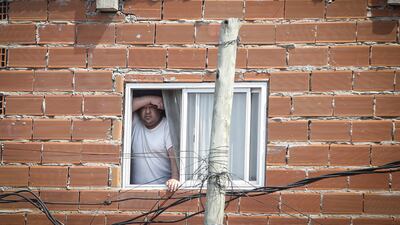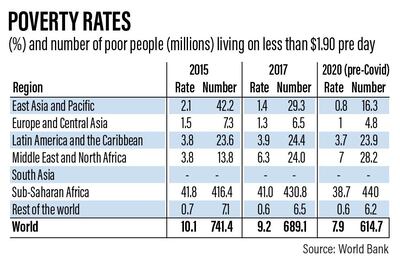The Covid-19 pandemic will push up to 150 million people into extreme poverty by 2021, hitting middle-income countries the hardest and reversing gains made in reducing poverty levels over the last two decades, the World Bank said.
The crisis will push 88 million to 115 million people into extreme poverty this year alone, depending on the severity of the global economic contraction, the World Bank said on Wednesday. This marks the first rise in worldwide extreme poverty – defined as living on less than $1.90 a day – since 1998.
These scenarios translate into a global poverty rate ranging between 9.1 per cent and 9.4 per cent in 2020 and between 8.9 per cent and 9.4 per cent in 2021, according to the World Bank.
Global poverty had dropped at a rate of around 1 percentage point per year between 1990 and 2015. However, the rate of reduction in poverty slowed between 2015 and 2017, data shows.
The projected poverty rates in 2020 are similar to those in 2017, indicating that the impact of the pandemic is expected to set back progress towards ending extreme poverty by at least three years.
"The pandemic and global recession may cause over 1.4 per cent of the world’s population to fall into extreme poverty,” David Malpass, president of the World Bank, said. “In order to reverse this serious setback to development progress and poverty reduction, countries will need to prepare for a different economy post-Covid, by allowing capital, labour, skills and innovation to move into new businesses and sectors."
The Covid-19 pandemic has unleashed the worst recession since the 1930s Great Depression, disrupted global supply chains, hampered international trade and dealt a blow to key sectors from aviation to shipping. The World Bank expects the global economy to contract 5.2 per cent this year.
Globally, the pandemic has claimed more than 1 million lives, according to tracking data from Worldometer. The number of people infected passed 36 million, while more than 27.1 million have recovered.
The Covid-19 pandemic and the subsequent economic crisis have compounded issues of conflict and climate change that were already slowing down progress in reducing poverty, the World Bank said in its report, Reversals of fortune: Poverty and shares prosperity 2020.
Many of those joining the ranks of the poorest this year, the so-called "new poor", will be in countries that already have high poverty rates, the lender added.
About 82 per cent of those entering extreme poverty will be in middle-income countries, according to World Bank estimates. Increasing numbers of urban dwellers are expected to fall into extreme poverty, which has previously typically affected people in rural areas.
South Asia will be the region hardest hit, followed by sub-Saharan Africa, the report showed.
Those entering into extreme poverty this year are predominantly rural, young and undereducated, the report said. The profile differs in in high-income economies, where poverty is skewed toward the elderly.
"Women are overrepresented among the poor globally and also across most regions of the world," the report said. While Europe and Central Asia, Latin America and the Caribbean, and other high-income economies have low female poverty, east Asia and Pacific, south Asia, and sub-Saharan Africa have high female poverty.
The Covid-19 pandemic, the pressures of conflict and climate change will put the goal of ending poverty by 2030 "beyond reach without swift, significant and substantial policy action", the World Bank said.
By 2030, the global poverty rate could fall to about 7 per cent, the Washington-based lender said.
The Covid-19 crisis has also diminished shared prosperity – defined as the growth in the income of the poorest 40 per cent of a country’s population.
Average global shared prosperity is estimated to stagnate or even contract in the period between 2019 to 2021 due to lower growth in average incomes.
"The deceleration in economic activity intensified by the pandemic is likely to hit the poorest people especially hard, and this could lead to even lower shared prosperity indicators in coming years," the report said.
If no actions are taken, the Covid-19 crisis may trigger cycles of higher income inequality, lower social mobility among the vulnerable and lower resilience to future shocks, the World Bank cautioned.



